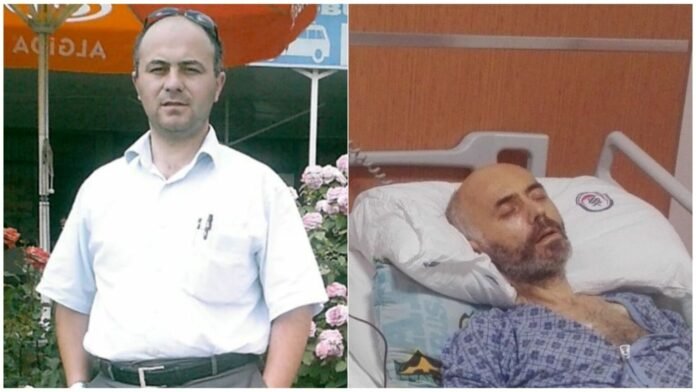Ümit Gökhasan, a former police superintendent who was not released from prison until his cancer had spread to other parts of his body, has died, Bold Medya reported.
Gökhasan’s death was announced by his wife, Şükran Gökhasan, on her Twitter account. She told Bold Medya the details of his last moments. “My husband lost consciousness around 1 a.m., and he died shortly thereafter,” she said. “He suffered greatly.”
Güzel dostlar nefesimi oksijenimi her seyimi kaybettim eşim Ümit gökhasan Vedat etti Allah im eşime merhamet eyle ben şahidim eşim tertemiz bir ömür yaşadı onu merhametinle karşıla cenneti alada efendimize en yakın komşu eyle
— Şükran Gökhasan (@skrngkhsn) November 22, 2020
Gökhasan was arrested on March 8, 2017 on charges of links to the Gülen movement, a faith-based group inspired by Muslim cleric Fethullah Gülen, and was sentenced to six years, 11 months in prison. His case was awaiting review by the Supreme Court of Appeals.
Turkish President Recep Tayyip Erdoğan has been targeting followers of the Gülen movement since the corruption investigations of December 17-25, 2013, which implicated then-Prime Minister Erdoğan, his family members and his inner circle.
Dismissing the investigations as a Gülenist coup and conspiracy against his government, Erdoğan designated the movement as a terrorist organization and began to target its members. Erdoğan intensified the crackdown on the movement following a coup attempt on July 15, 2016 that he accused Gülen of masterminding. Gülen and the movement strongly deny involvement in the abortive putsch or any terrorist activity.
Following the abortive putsch, the Turkish government declared a state of emergency and carried out a massive purge of state institutions under the pretext of an anti-coup fight. Over 130,000 public servants, including 4,156 judges and prosecutors as well as 20,571 members of the armed forces were summarily removed from their jobs for alleged membership in or relationships with “terrorist organizations” by emergency decree-laws subject to neither judicial nor parliamentary scrutiny. Tens of thousands were jailed on terror-related charges.
Gökhasan was first diagnosed with stomach cancer in January 2020. He underwent surgery on February 13, 2020 in which his stomach and part of his esophagus were removed. He was sent back to prison two weeks later and began receiving chemotherapy.
His treatment was stopped due to the COVID-19 pandemic, after which the cancer spread to other parts of his body. His wife tried to make his problems heard by authorities, but to no avail.
The Afyon State Hospital in western Turkey issued a health report saying that Gökhasan could stay in prison and that there was no reason to postpone his sentence.
The prosecutor’s office denied Gökhasan’s release from prison based on the report. However, when the family objected, the hospital revised its decision and issued a report stating he was 80 percent disabled.
The prosecutor’s office issued his release based on the new report on August 7, but it was too late. Gökhasan’s condition took a turn for the worse last month as the cancer had spread to his lungs, spleen and bones.
Gökhasan was convicted of membership in a terrorist organization for depositing money in Bank Asya, a bank affiliated with the Gülen movement, and using the ByLock messaging app on his smartphone.
ByLock is an encrypted messaging app used in smartphones and was available on Apple’s App Store and Google Play. Turkish authorities claim that ByLock is a communication tool exclusively used by members of the Gülen movement to ensure the privacy of their conversations. The app was permanently shut down in March 2016, before the movement was declared a terrorist organization by the Turkish government.
In an opinion on the summary extradition of alleged members of the Gülen movement from Malaysia to Turkey, the UN Human Rights Council’s Working Group on Arbitrary Detention stated that “such regular daily activities as having a bank account and using a communication application” could not be considered evidences of a crime by themselves.
The situation of seriously ill prisoners has been scrutinized by human rights activists and opposition politicians.
Ömer Faruk Gergerlioğlu, a prominent human rights activist and deputy from the pro-Kurdish Peoples’ Democratic Party (HDP), has depicted the deaths of critically ill prisoners in Turkey who are not released in time to receive proper medical treatment as acts of “murder” committed by the state.
“These deaths are acts of murder. The ruling party is the murderer, and state institutions along with the Ministry of Justice involved in this wickedness are accomplices to the crime,” he told the Kronos news website.
According to Gergerlioğlu, prison administrations, judicial bodies, deputies in parliament, the Ministry of Justice, and some doctors treat prisoners according to their “type of crime.” “Even doctors treat their patients according to the prisoners’ ideological leaning and affiliation. Their most basic rights are violated. They apply the so-called ‘enemy law.’ Doctors, hospitals, gendarmes, prison guards and lawyers all act as if they made a joint decision.”
According to Gergerlioğlu sick prisoners are released when the authorities realize they will die soon. “They don’t want to be held responsible if an inmate dies in prison. So they release them in great haste when they realize the prisoner will die soon. And they do indeed die a short time after their release. When I ask the Justice Ministry for the number of deaths in prison, they give very low figures. Very low because they don’t want prisoners to die in prison. They keep them until the very last moment, and when they realize they are going to die, they release them immediately.”
According to the Human Rights Association (IHD) there are currently 1,605 sick prisoners in Turkish prisons, 604 of whom are critically ill. Although most of the seriously ill patients have forensic and medical reports deeming them unfit to remain in prison, they are not released. Authorities refuse to release them on the grounds that they pose a potential danger to society. In the first eight months of 2020, five critically ill prisoners passed away because they were not released in time to receive proper medical treatment.
















[…] Radical Islamist Turkish daily Yeni Akit columnist Mehtap Yılmaz’s hate campaign targeting cancer patient Ümit Gökhasan and his release from prison delayed the medical treatment of the former police superintendent, who died on Monday. […]
[…] Radical Islamist Turkish daily Yeni Akit columnist Mehtap Yılmaz’s hate campaign targeting cancer patient Ümit Gökhasan and his release from prison delayed the medical treatment of the former police superintendent, who died on Monday. […]